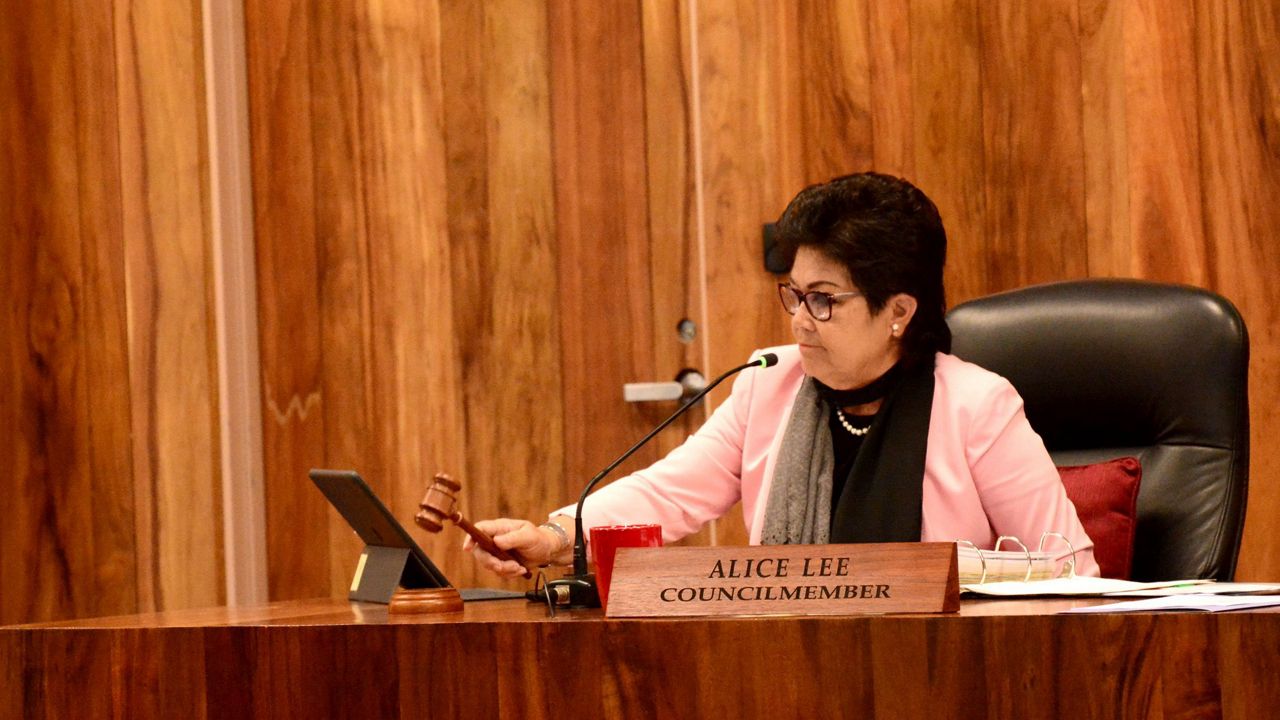The Hawaii Supreme Court ruled Friday that incumbent Alice Lee was the rightful winner of the Wailuku-Waihee-Waikapu seat of the Maui County Council in last year’s general election despite the county clerk’s failure to properly notify some 215 voters of problems with their mail-in ballot envelopes.
In a 3-1 decision, the court determined that Noelani Ahia, Lee’s opponent in the tightly contested race, and 30 other plaintiffs failed to prove that any error or mistake on the part of the clerk was sufficient to change the outcome of the election.
Lee, whose status on the Council has been in limbo since the Nov. 8 election, said she was “shocked and pleasantly surprised” that the ruling came just a day after oral arguments were presented.
“It’s been 74 days since the election, which is a lot of downtime when I could have doing a lot more productive things,” she said.
The Council has been operating with just eight members but has deferred action on new measures pending the resolution of the challenge.
While the rest of the Council travels to Oahu for Monday’s State of the State address by Gov. Josh Green, Lee said she will arrange to take her oath of office so that she can rejoin the Council as soon as the other members return.
“There’s a lot of catch-up work,” she said.
As Lee had predicted, the court’s decision came down to simple math.
The final accounting by the state Office of Elections had Lee with 22,733 votes to Ahia’s 22,220, a difference of 513.
Of the total number of mail-in ballots returned between Oct. 22 and Nov. 9, 865 return-identification envelopes were determined to be deficient due to a missing signature, a signature that did not match what was on record, or other condition.
The county clerk’s office mailed notices to each of these voters informing them of the deficiency and how to “cure” it. Ultimately, 159 of these voters responded to the notice and corrected the deficiency. The remaining 706 votes were not counted.
The plaintiffs’ argument that notices of deficiency were not mailed in a timely manner was based on 215 notices that were mailed on Nov. 12, four days after the election and just three days before the deadline to remediate any deficiencies. At least some of the 215 received their notices just one day before the deadline.
According to the clerk, the delay in mailing out the final batch of notices was due to election officials assisting voters on Nov. 8, dismantling the voter service center on Nov. 9 and 10, and the Veterans Day holiday on Nov. 11.
In its ruling, the court concluded that the county clerk “did not make reasonable efforts to determine the validity” of the 215 ballots for which notices were mailed on Nov. 12.
“It was a mistake for the Clerk to prioritize the breakdown of the voter service center to return the facility to another department of the county and the related activities of returning rented equipment or storing election equipment over providing the notice-to-cure to these,” the justices wrote. “We are not persuaded by the Clerk that it was reasonable to prioritize this other work over contacting voters with deficient return identification envelopes. As this court has stated, ‘The right to vote is perhaps the most basic and fundamental of all the rights guaranteed by our democratic form of government.’”
Yet, the court ultimately ruled that because the 215 votes represented by the delayed notices sent on Nov. 12 fell short of the 513 votes that separated Lee and Ahia, the plaintiffs “failed to establish a mistake that would change the outcome of the election.”
In his dissenting opinion, Associate Justice Michael Wilson argued for a different means of calculation.
Wilson said the 215 votes should be deducted from the 513-vote difference between Lee and Ahia, thus tightening the prospective margin of victory to 298.
Wilson noted that of the 706 total ballots that were invalidated, 463 were ballots with signatures that bore signs of invalidity.
“It was incumbent on the election officials to act reasonably to verify the signatures about which they had questions,” Wilson wrote.
Reasoning that the addition of the 463 ballots set aside to investigate mismatched signatures to the 215 wrongly invalidated ballots would exceed the 513-vote margin by 165 votes, Wilson wrote, “The election must be set aside and the clerk directed to hold another election in accordance with the presumption of validity that protects the most important right born by the citizens of Hawaii: the right to vote.”
Ahia said she was “definitely disappointed” by the court’s ruling but added that she felt vindicated by its determination that the clerk had acted improperly in delaying the mailing of notices-to-cure.
She said that since filing the challenge, she has been contacted by numerous voters who either were notified of deficiencies and were unable to get help curing their ballots or who were never notified and only learned of their invalid votes by checking the state’s vote-tracking tool.
“The biggest loss is for the voters who were disenfranchised,” Ahia said.
Ahia said she intends to run for the council again in two years. In the meantime, she has taken a position in councilmember Keani Rawlins-Fernandez’s office to get a deeper understanding of the systems and procedures involved with the position.
Friday's ruling has significant implications for the balance of power on the council. Ahia campaigned with a bloc of progressive council members that included incumbents Rawlins-Fernandez, Gabe Johnson, Tamara Paltin and Shane Sinenci.
